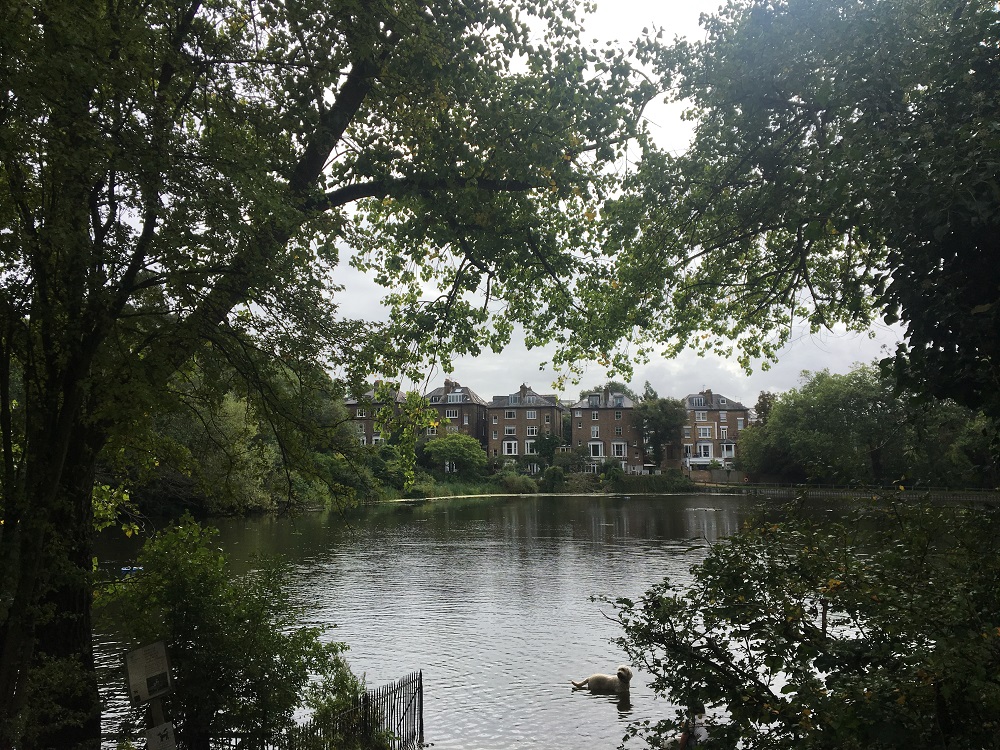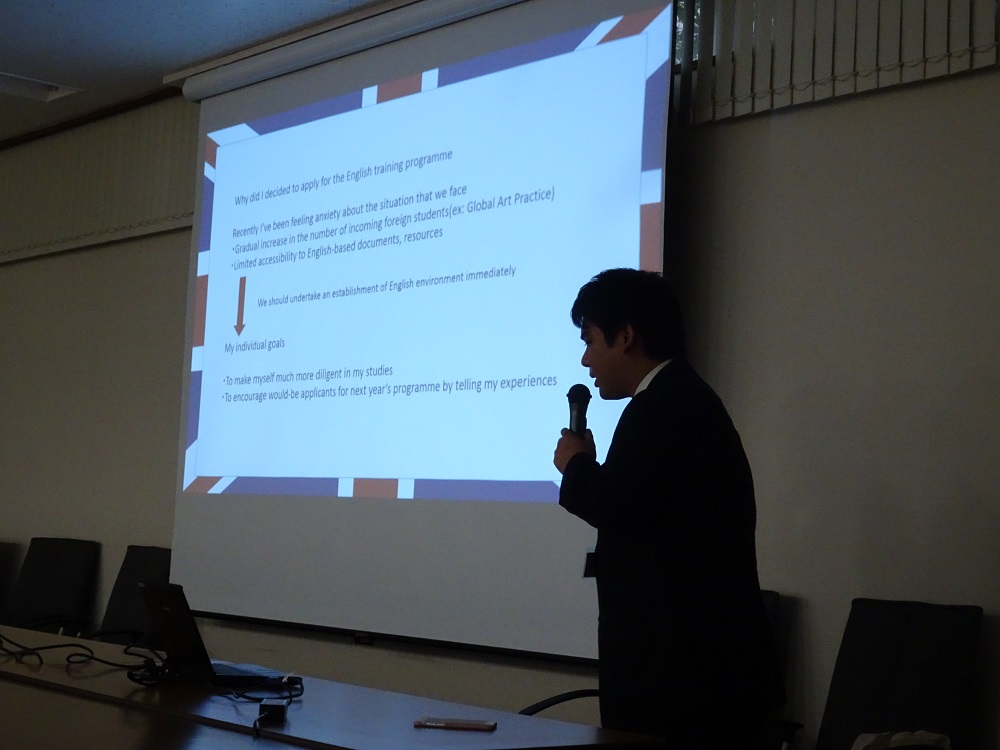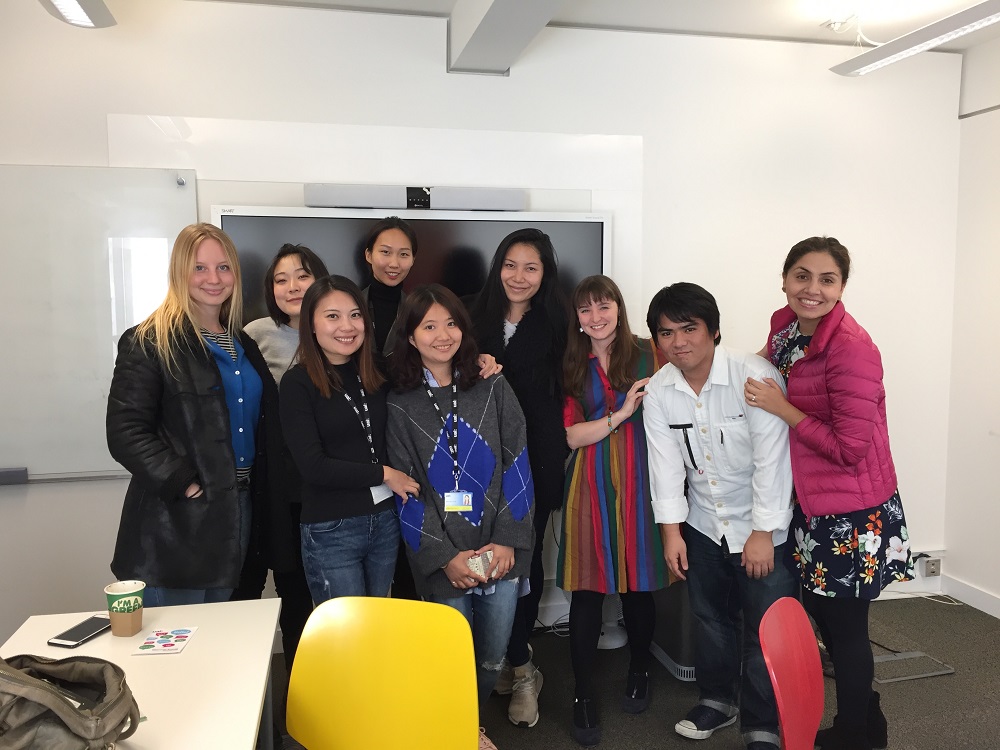平成29年度事務職員を対象とした英語研修「特別集中コース」研修後レポート(イギリス・ロンドン)①2017 English training program for administrative staff: an intensive course in London (No. 1)
January 05, 2018
英語研修について
スーパーグローバル大学創成支援事業への採択を皮切りに、近年本学では、外国人留学生受入の拡大や海外機関との交流強化など、国際化に向けた様々な取り組みをより一層推進しています。その一環として、本学では平成27年度より、国際対応業務をより円滑に遂行することを目的として、事務職員を対象とした英語研修を実施しています。
本研修においては、これまで集合型研修、民間英語サービスの利用など、様々な取り組みを行なってきましたが、今年度は、初の試みとして、海外研修を含む特別集中コースを取り入れました。
特別集中コースは、国内もしくは本学と国際交流協定を締結している海外の大学機関付属又は周辺地域の語学学校において一定期間の集中的な語学学習・異文化体験等の機会を提供することにより、より実践的で国際的な対応力を備えた職員を養成することを主な目的として設計されたものです。
本コースの初の受講者として、イギリス・ロンドン芸術大学ランゲージセンターで語学研修を行った美術学部教務係の尾崎さんのレポートを以下に掲載します。
特別集中コース 研修後レポート
私は、現在美術学部の教務係で履修・成績や博士学位審査関連の業務を担当しております尾崎と申します。この度、本学職員向けの英語研修の一環としてロンドン芸術大学に付属のランゲージセンターにて9月4日から9月29日までの4週間授業に参加いたしました。
海外での研修に参加したきっかけ
現在美術学部では様々な国から留学生が来て学んでおり、教務の窓口においても英語での対応を求められる場面が少なくありません。大学としてグローバル化を推進している背景もあり、今後より一層海外から学びに来る学生が増えると考えられます。そういった中でしっかりと学生のニーズに応え、彼らが学びやすい環境を整えていくために、職員も十分な英語力を有する必要があります。そこで今回は私自身の英語技能の向上はもちろんのこと、職員全体の中でより主体的に英語を学ぶ気運を醸成することも一つの目的に据えて、海外での英語研修に臨みました。
研修の内容について
4週間の間、平日は毎日語学学校へ登校し、授業を受けていました。各学生の英語力によって7段階にクラスが分かれており、登校初日に受けるテストの結果によって振り分けが行われます。1クラスの人数は10名ほどで、年齢や国籍もバラバラな多様な学生が集まって授業を受けていました。授業の中では発言を求められる機会がとても多く、皆が主体的に授業に臨む姿勢を目の当たりにし、大変刺激的でした。一般的に読み書きの技能の修得に重点が置かれがちな日本での英語学習と比して、より実用的な英語を学ぶことができたと思います。また、毎週1回は授業の一環として近隣の博物館や美術館、公園などを巡る機会もあり、そういった中で座学だけでは学べないことも学ぶことができたと実感しています。
こちらの語学学校はロンドンの中心部のホルボーンと呼ばれるエリアに位置しており、どこに行くにも大変交通の便が良かったため、放課後にはクラスメイトと食事に出かけたり近隣のカフェなどで宿題を片付けたりしながら日々過ごしていました。また、現地に滞在している間は学校から4,50分離れた閑静な住宅街でホームステイをしていたので、ステイ先のファミリーとの交流を通じてイギリスの文化の一端に触れることができ、貴重な経験となりました。初めのうちは異国の地での慣れない生活の中で不安を感じることもありましたが、色々な方のサポートを受けながらとても快適に研修期間を過ごすことができました。

研修の成果と今後の抱負について
実のところ、やはり4週間という期間は語学を学ぶには十分な期間とは言えませんので、語学力の点において劇的に変化があったとは思いませんが、色々な体験を通して視野が広げることができたと確信しています。また、自分が学生の立場として海外に渡航したことで、日本に来る留学生がどのような不安や悩みを抱えているか知ることができたので、学生の目線に立って十分なサポートができるように努めていきたいと考えています。加えて、外国語の学習は長期的に継続しなければ効果が期待できないという点を常に忘れず、帰国後も学習に励んでいきたいと思います。そしてそうした姿勢が少なからず周囲にも影響を与えられるようになれば嬉しく思います。

帰国後の研修成果報告会の様子
Selected for the Top Global University Project, Tokyo University of the Arts (Tokyo Geidai) has been pushing forward globalization through various means such as accepting an increased number of international students and strengthening ties with overseas institutions. As part of such globalization efforts, since the academic year 2016, we have started an English language training program for our administrative staff to equip them with skills that will enable them to more effectively engage in international operations.
While we have adopted different types of English language learning programs such as group lessons and online courses offered by private service providers, we started some new programs this year and one of them is an intensive overseas training program.
This intensive program has been designed with the primary objective of preparing our staff ready to work in more practical and international settings. The participants take classes at a language school either affiliated to or in the vicinity of our overseas partner institution, during which they learn English intensively for a set period of time and experience a foreign culture.
Following is a report written by Mr. Taishi Ozaki of Faculty of Fine Arts Educational Affairs Section, who studied on this program at the Language Center, University of the Arts London in September 2017.
Report
My name is Taishi Ozaki and I am a member of the educational affairs section in the faculty of Fine Arts. I have participated in an English training program for administrators which is organized by the international office of the university. I stayed 4 weeks (4th ~ 29th September 2017) in London to attend classes at the Language Center, University of the Arts London.
The reason I applied for this English training program in the UK
There are many foreign students studying here, and as we are one of the Super Global universities aiming for further globalization in terms of educational environment, the number of foreign students will increase continuously. Under these circumstances, we, administrative staff, need to acquire enough English skills to meet the requests of our international students and establish an environment where they can make them comfortably study in Japan. Therefore, I’d set the goals of this training program that I should not only improve my English skills but also use my experience in the UK to encourage my colleagues to study English much harder.
The contents of the program
I attended classes in every weekdays for whole four weeks. All students must take an exam in the first day in the language center, and are divided into seven classes according to their English levels. Each class consists of about ten students who are different in country, age, cultural background. We were frequently required to express our opinions or feelings in the classes, and I was really stimulated by other students’ positive attitudes. I suppose I could learn practical English in the class compared with classes I’d experienced in Japan which were mainly focusing on acquiring reading and writing skills. Once in every week I had a chance to join a class trip visiting museums, parks and other cultural places near the language center, which taught me many things that I might not have been able to learn by studying only in the classroom. The language center is located in center of London and I could easily find nice places for lunch with friends after class and also for concentrating on doing homework. My accommodation was located in 40~50 minutes away from the center. Actually I was a bit anxious about homestaying, because it was the first time for me to live in someone’s home, but my host mother was so welcoming and I could experience the British culture through the time I spent with her. The staff in the language center were also very helpful and provided me comfortable stay there.

What I achieved and future goals
To be honest, four weeks are not enough to improve foreign languages, and I don’t think my English skills have dramatically improved, but I strongly believe that I could broaden my point of view through this overseas experience. Moreover, I’ve noticed what kind of anxiety or worrying foreign students coming to our university have. Now I’d like to give warm support for them to have good study experience here in Japan. In addition, I’m eager to continue studying English with keeping in my mind that acquiring a foreign language could be achieved only by lifelong learning. I would be so happy if this report of the UK training could motivate other staff members in my office to study English even harder.



